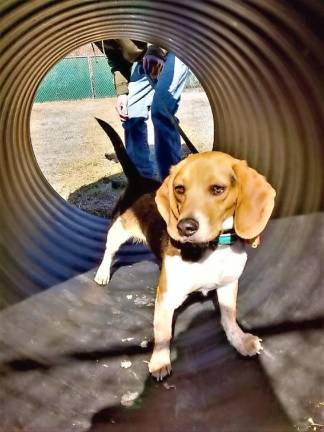Rosco the Rocket sprints toward a clean bill of health
Hewitt. Greenwood Lake Animal Hospital veterinarian Dr. Eric Louer developed a special drug protocol with parasitologists at Cornell University that sped Rosco’s recovery.

Rosco Brembt is fast. At just over a year old, the tri-color Beagle mix had earned himself the full name of Rosco the Rocket, for his ability to take off like a shot throughout the house, owner Karen Brembt said.
But there was one thing even he couldn’t outrun: a hookworm infection that simply refused to resolve.
“Dr. (Eric) Louer said put him on dewormers, and we’ve done that for nine months now and he just got clear,” Brembt said.
Hookworms are vampire-like intestinal parasites that hang onto their host’s intestinal wall and suck their blood.
Rescued from South Carolina
Rescued from a shelter in South Carolina, Rosco made his way to New Jersey in January, Brembt said, bringing his stubborn case of hookworms with him.
It’s common for dogs with intestinal parasites to have diarrhea, and Rosco had the telltale sign but not consistently, Brembt said.
“He had diarrhea, he had hard stools, he had soft stools,” she said. “Everything you can think of, he had it.”
Now almost two years old, the Rocket has been on a special drug protocol Louer developed with parasitologists at Cornell University.“
Multi-drug resistant hookworms
“There are reports of multi-drug resistant hookworms,” Louer, the owner of the Greenwood Lake Animal Hospital, said. “It started with Greyhounds in Florida at the track, and, basically, these hookworms don’t respond to traditional (medications). It’s being reported more and more.”
In Rosco’s case, Louer said he was treated consistently with medication that, theoretically, should have gotten rid of the parasites, but there were always eggs showing up in the stool samples when they were tested at the lab.
“Now there’s new protocol, and that was a combination of Advantage Multi and Drontal Plus,” Louer said. “That’s what we did and that’s why finally we got a negative fecal after nine months!”
Just because there was finally some good news doesn’t necessarily mean Rosco’s out of the woods, however.
With another stool sample recheck due in a couple months, Louer was cautiously optimistic.
“It may not be over,” he said. “We have to wait and see.”
This story and photograph were provided by Veterinary Technician Nicole Wells.